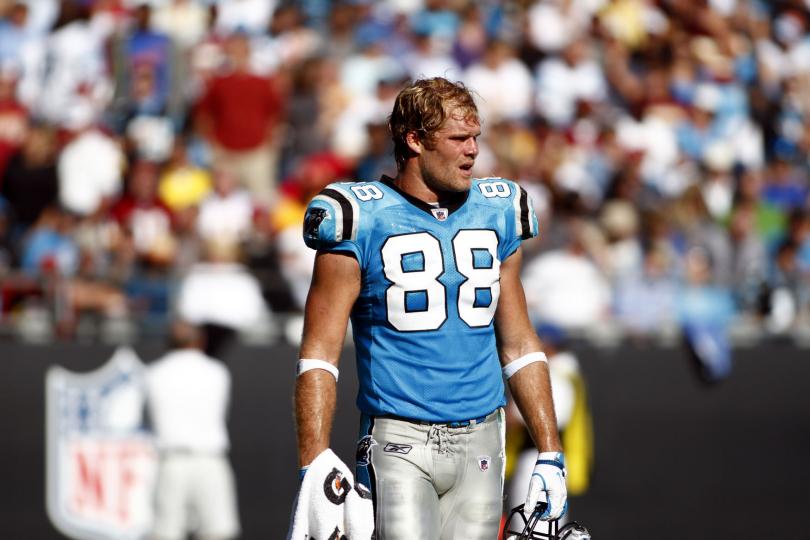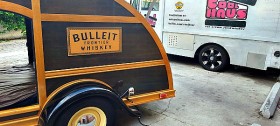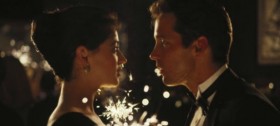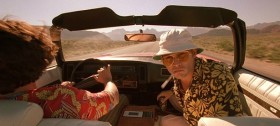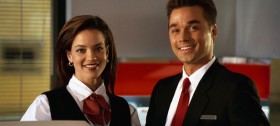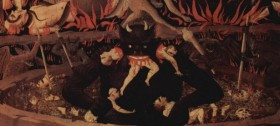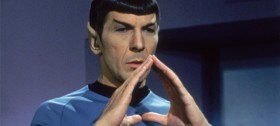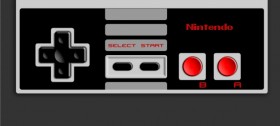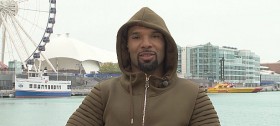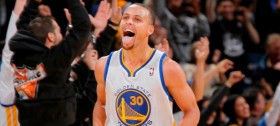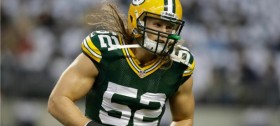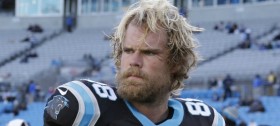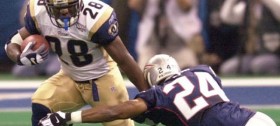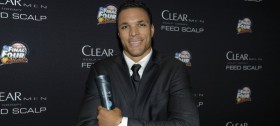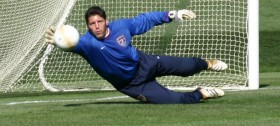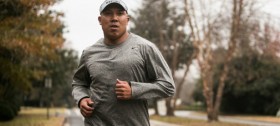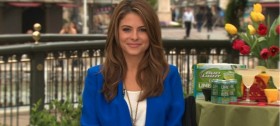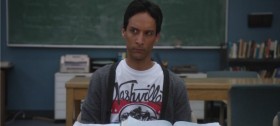Posts tagged Interview

Matt Forte Interview
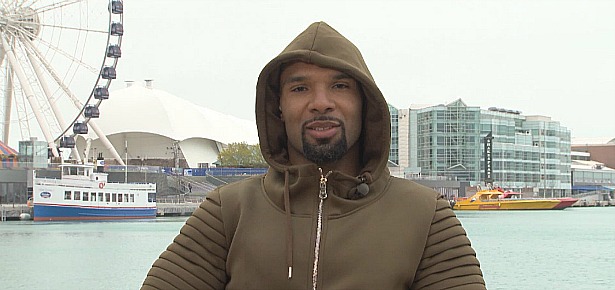
It’s the night before the 2016 NFL Draft. Tomorrow night, a bunch of young football players will be millionaires. Almost half of these guys will be busts. That’s just how it goes. The stakes are as high as the hopes. And in the NFL, hope is what gets you paid.
NFL teams don’t reward yesterday’s stars for yesterday’s stats. Not like they do in the NBA. Can you imagine the Broncos bringing back Peyton Manning for a Kobe-style victory lap season as a thank you for his past efforts? No way. The NFL doesn’t work like that. If you don’t produce, you’re gone. It’s that simple. If you get paid, it has much more to do with your future potential than your previous accomplishments. The next man up is probably more affordable anyway.
Sure, there are exceptions. When the Steelers paid Troy Polamalu after he was gassed, it was more a gesture of thanks than an expectation of All-Pro production. But for the most part, NFL players have to produce to get paid and even when they produce, they may have to get paid somewhere else.
Matt Forte has produced. For eight very solid seasons. Since entering the league in 2008, he has more yards from scrimmage than any other player in football (12,718). Forte has more targets (636) and catches (487) than any running back during that span. He also owns the single-season reception record for a running back (102).
And since he entered the league eight seasons ago, no one has more touches (2,522) than Forte. Nobody.
Therein lies the problem, though. Because of how NFL teams reward players, Forte knew he wasn’t going to cash in with a third contract from the Chicago Bears. It became clear last season that the Bears wouldn’t even try to re-sign him. Mediocre NFL players are expendable, but ultra-productive NFL running backs turning 30 with more touches and total yards from scrimmage than anyone else over an eight year stretch are expendable, too.
But Forte found a home with the New York Jets, who signed him to a three-year, $12 million deal ($8 million guaranteed) this offseason. If he can stay healthy, he can certainly be a force in that offense. That’s the hope, anyway.
Leading up to the most hopeful day on the NFL calendar, we sat down with Matt Forte to chat about his new team, new coach, God, Tom Brady, the most under-appreciated player in football, the 2016 NFL Draft and how Verizon can help you stream draft coverage tomorrow on your mobile device with the Verizon NFL Mobile App. Here’s the video:
Apr 27th

Stephen Curry Interview
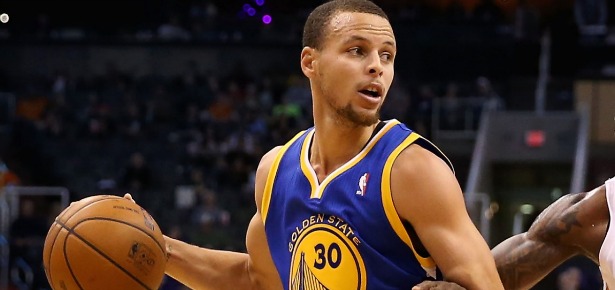
The Golden State Warriors have the best record in the NBA and two-time all-star Steph Curry is a big reason why. An early favorite to win the MVP, Curry’s been lighting it up for a while now. But this year just feels different. Everything’s clicking for Golden State and first-year head coach Steve Kerr. The Splash Brothers are dominating from the perimeter again, yes, but the high octane offensive attack is now balanced by one of the league’s best defenses. Golden State is winning with conviction, too. Enjoying their hottest start in franchise history, the Warriors boast a league-best 11.5 margin of victory to go along with their 38-8 record.
And Curry’s just locked in, man. Top ten in points per game. Top five in assists, steals and free throw percentage. It’s all coming together for the youthful-looking point guard from Davidson.
Now you may think the guy looks like he’s 14 years old, but he’s full grown man of 26. That’s not to say he wasn’t an absolute baller when he was 14. When your dad plays 16 sharpshooting seasons in the NBA, there’s a good chance you’ll develop an appreciation for the game of basketball. Steph’s younger brother Seth is also a professional player who’s plying his trade for the Erie BayHawks, the Orlando Magic’s NBA developmental team.
So the guy’s a natural. Basketball’s in his genes. That’s not to say he doesn’t work hard. You don’t develop such a silky smooth jumper without putting in some time. But as Curry explains in this DegreeMen Game Changer spot, finding your own game is a careful balance.
After this spot ran, Steph Curry and John Wall of the Washington Wizards engaged in a playful/promotional exchange on Twitter. The two all-stars are now set to square off against each other for the title of Ultimate Game Changer in the Degree Battle of the Game Changers. It’s a shot-for-shot type showdown where each player has to match the other and fans get to vote on which shot they’d like to see by going to Twitter.com/DegreeMen after February 9.
We talked with Curry about the upcoming Battle of the Game Changers, first-time head coach Steve Kerr, who he thinks has the sweetest jumper of all time and what pointers he has for people with no shot whatsoever. Here’s the interview:
Make sure to check out the Degree Battle of the Game Changers live on NBA TV during the NBA All-Star Practice on February 14.
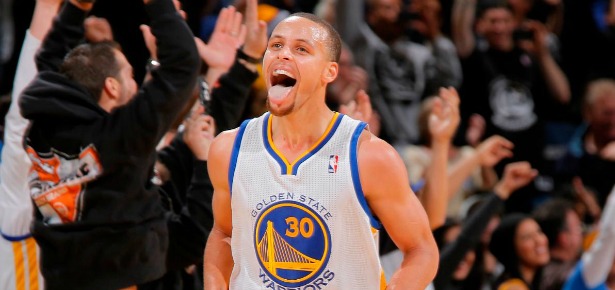
Feb 4th

Clay Matthews Interview
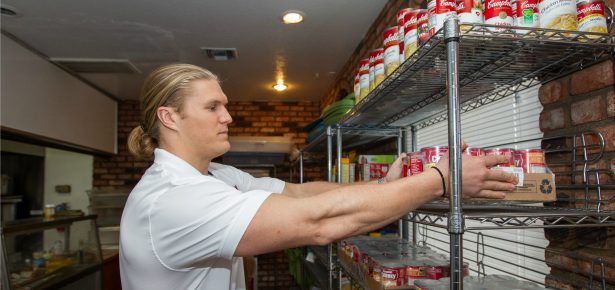
Last week we met up with All-Pro linebacker Clay Matthews at the Greater West Hollywood Food Coalition. Matthews and Campbell’s Soup were making a donation of 5,000 cans of Campbell’s Chunky as part of the Soup for Sacks program.
Last season, each time Matthews sacked an opposing team’s QB, Campbell’s donated 1,000 cans of soup to a local food bank in the opposing team’s city and 1,000 cans to the local food bank in Green Bay. In total, Campbell’s has donated over 40,000 cans of soup to food banks across the nation and they’ve helped raise $18,000 for Matthew’s charity, the CM3 Charitable Fund.
The Green Bay Packers linebacker, who’s a native of Southern California and played college ball at USC, was on hand in West Hollywood with his mom, because, you know, that’s what Campbell’s Chunky Soup is all about. As the face of the Campbell’s Chunky Soup “Mama’s Boy” campaign, Matthews and his mom were on hand for the donation and we got to spend a few minutes with him talking about the Sacks for Soup program, his football family heritage, Matthew’s path to the NFL, Pete Carroll, Kevin Greene, Green Bay’s injury woes and draft needs and a whole lot more. Check it out:
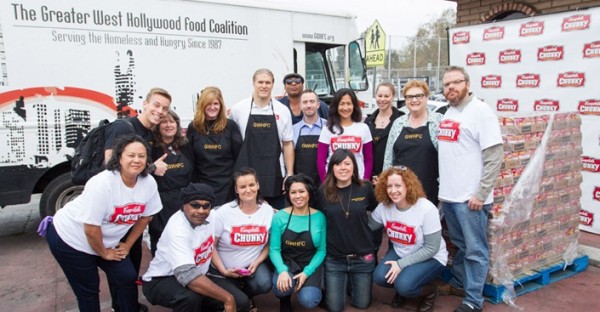
Mar 7th

Greg Olsen Interview
Greg Olsen plays in the National Football League as a tight end for the Carolina Panthers. He started his career with the Chicago Bears in 2007. He has been through a lot in the league, but he had his toughest challenge off the field. During the offseason in 2012 Greg and his wife, Kara were ecstatic when they received the great news of Kara being pregnant with twins. They already had one son and now their family was about to get bigger.
Sadly they got news that one of their babies would be born with a severe congenital heart defect (CHD), called Hypoplastic Left Heart Syndrome. Thankfully Greg and Kara went to Levine Children’s Hospital where both babies were born. Their son TJ has CHD and he needed a few operations on his heart. Now almost a year and a half has passed and TJ is doing well.
The Olsen’s wanted to help out other families who would deal with CHD. They set up “T.J.’s ‘HEARTest’ Yard” program under their Receptions for Research foundation. This program provides families of babies affected by CHD with many programs that include in-home, private nursing care, physical therapy and speech therapy as well as more outstanding services.
Greg was kind enough to chat with me about his family’s journey with TJ and CHD, his foundation, and a bit of football.
Art Eddy: The second week of February is CHD Awareness Week. I am very grateful for you to take the time and talk about how CHD impacted your family. Two years ago when you found out that TJ had CHD what was going through your mind at that point? 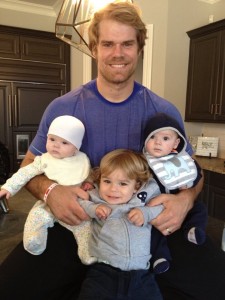
Greg Olsen: It was scary. Up to that point we really didn’t know anyone who had a congenital heart defect. We got the news that he was going to be born with a serious heart defect called Hypoplastic Left Heart Syndrome. It came to us as a great shock. We were obviously scared. There was a lot of uncertainty. It was something as a family that we had to work through.
We have had unbelievable doctors and the care that our son was able to have here. We were very fortunate that he is almost a year and a half. He really has come a long way.
AE: Reading up and watching videos on your family’s journey it looks like TJ’s battle with CHD made you guys a stronger family. You don’t sweat the minor things. It is incredible to watch the strength that these kids have as they battle with CHD. As a father how did you try and keep it together for the rest of the family while TJ was going through his procedures?
GO: It was hard. We had our weak moments. We definitely had our moments where we could have handled it better. You just try and do the best you can. We took it one day at a time. We would try not to get ahead of ourselves trying to predict the future.
That worked for us. Worrying about the moment now. What is the best thing that we can do for the long term health of our child, but what could we do today? It wasn’t what can we do in six or eight months. We got the diagnosis early before the babies were born. It gave us a lot of time to help prep ourselves. It also gave us a lot time to sit back and worry. It was a tough time there before the babies were delivered.
Once they were delivered I think it was nice to just move forward to the surgery. At that point it became real as opposed to just sitting around waiting.
AE: I really appreciate all the work you and your staff do for your foundation Receptions for Research. Tell me a  bit about the foundation and T.J.’s ‘HEARTest’ Yard.
bit about the foundation and T.J.’s ‘HEARTest’ Yard.
GO: Receptions for Research is our family’s foundation. In the past year or so we started the “HEARTest Yard” program with Levine Children’s Hospital here in Charlotte. This is where TJ has had all his surgeries. That is where we have gotten all our medical care.
We approached them about starting a cutting edge, never been done before privatized health care program. Administered by the hospital, but completely funded by us through our foundation. It is done either by us personally or by our fundraising efforts. It brings that world class care from the hospital and bridges it into the home.
That is the biggest thing that we felt we could have used. More help to bring in specialists. Bringing in nursing care. Bringing in physical therapists. All of those things. That is really the inspiration of what the program is. There is a handful of families that have already started in the program. We continue to get unbelievable feedback about the efforts to help the family’s peace of mind and more importantly the health and future of the baby. It really has been positively received and we are very excited about it.
AE: How can people help your foundation out?
GO: They can visit our website, Receptions for Research dot org. One of our main pages there will be the “HEARTest Yard” link. It will bring up all of our future events. It will give ways that people can sponsor. It will give a little more information about the actual program. It will give more information on what Hypoplastic Left Heart is. They can pretty much get everything about the foundation, the hospital, what actually HLHS is all on the website.
AE: How has becoming a dad changed you?
GO: You learn a lot as a person. You learn a lot as a family. It is the most scary, the most nerve racking, but also the best thing that has ever happened to me. Being able to come home and see these kids every day. All three of them run to the door now. They say hi and their eyes light up. It is just something special. Until someone is a father it is really 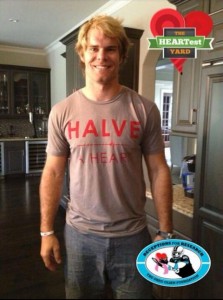 hard to explain it to them. I could go on for what it means to me. Especially what has gone on in our family over the past year has made it even that more special.
hard to explain it to them. I could go on for what it means to me. Especially what has gone on in our family over the past year has made it even that more special.
AE: What advice do you have for new dads out there?
GO: It is not going to be easy. There is no manual. It is not just come home and play catch all day. There is a lot of work. You need to put the time in to teach your kids on how they are supposed to act. Everything they learn is from you as their parent and as their dad. Especially the different relationships depending if you have a boy or a girl and the different dynamics that are in those relationships.
You kind of just learn on the fly. That’s at least what I did. You are not perfect, but you try to be the best you can for your children.
AE: Switching to the NFL. You and your team the Carolina Panthers started off rocky, but finished strong to get the number two seed in the NFC. What did you learn about your team this season?
GO: We really came along way. We were able to accomplish a few of our goals. We won the division. We were able to make it to the second round of the playoffs. We were able to accomplish some of our goals. Obviously we fell a little short of the ultimate goal of making it to the Super Bowl. It is something to at least build off of. We are eager to get started again and make another run.
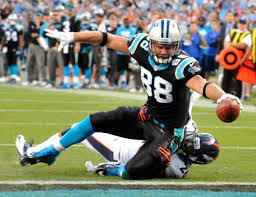 AE: When do you start to worry about the next season?
AE: When do you start to worry about the next season?
GO: Probably sometime in the next couple of weeks. I will start back up my training. Start getting everything lined up to get prepared physically and put all of that inline. I have taken the past few weeks just hanging with the family. Each day we take a few trips with the kids. Just trying to be around here and taking them to school, picking them up from school, and being there for dinner. That is something this time of the year that you have to take advantage of. I will get back to my training in a few weeks.
AE: Growing up did you have a NFL team that you would root for and did you have a favorite player?
GO: No I didn’t. I grew up in Northern New Jersey right outside of New York. So the New York teams were very prevalent up there. We would follow them there. They were the local games. So I guess them, but we were more into college football games. College football was something that was more on our horizon when we were growing up and getting into high school. I don’t think any of us could have imagined playing this long in the league. It is something that is incredible, but I don’t know if it was something I thought I could do all along. So I would say college sports was more of a bigger deal growing up.
Feb 11th

Marshall Faulk Interview
Even before Marshall Faulk played in the NFL many knew that he was going to be a superstar in the league. In college at San Diego State University Marshall was a three-time All-American. The Indianapolis Colts drafted him as the second overall pick in the 1994 NFL Draft. After his time with the Colts, he played for the St. Louis Rams.
Faulk is one of only three NFL players with at least 10,000 rushing yards and 5,000 receiving yards. Marshall has been named the league MVP, helped the Rams win Super Bowl XXXIV, and was selected seven times for the Pro Bowl. He was elected to the Pro Football Hall of Fame in 2011.
Faulk can be seen on TV shows such as “NFL Total Access,” “Thursday Night Football,” and “NFL GameDay Morning” on the NFL Network.
Before Super Bowl weekend I caught up with Marshall. He was working with Verizon to promote the “Who’s Gonna Win?” campaign in connection with the Empire State Building. Besides talking about that promotion we did chat about this year’s match up between the Seahawks and Broncos, his time in the NFL, and his induction into the Hall of Fame.
Art Eddy: You are part of Verizon’s “Who’s Gonna Win?” program, the first-ever social media-driven light show on the world’s most iconic building, the Empire State Building. Tell me a little about that promotion? 
Marshall Faulk: This whole “Who’s Gonna Win?” campaign is an initiative by Verizon. They are powering up the Empire State Building. Fans can help decide if their team’s colors will go up on the Empire State Building. It is a pretty cool program. Each day is going to be a different program leading up to Saturday.
Obviously everyone wants to know who is going to win. That is the interesting thing to see. Which team’s fans will get more involved and how many hashtags will be for Seattle or Denver is going to come into play. We will find out when the Empire State Building will be lit up.
AE: It sounds like a very cool program. Who do you think will win the Super Bowl? Broncos or Seahawks?
MF: I think it can go either way. I don’t have a favorite. Usually you can look at the numbers or watch how they play common opponents. It is so tough to tell. I keep telling people that only because Peyton (Manning) is a friend of mine that I just want to see him win another Super Bowl. Outside of that I really don’t know. I am not going to lie.
AE: Speaking of the Super Bowl you had the great fortune of playing in two of them. What was the week leading up to the game like?
MF: You want to say that it is all business. You are trying to have a normal week. Last night I saw that a bunch of players from the Seahawks have a team event. They showed some support for the (Brooklyn) Nets by going to the game. Those are the kind of things you want to do. Dinners, going to a basketball game, just things like that with your teammates.
Keep it in a team atmosphere. If you have family here, have dinner with your family. You don’t want to be that guy who is drawing negative attention to your team. That is what we are waiting for. We are in the media. We are trying to see who is going to be the idiot to try and do something stupid.
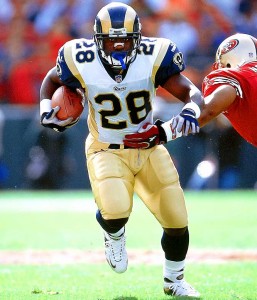 AE: When did the nerves go away when you played in your first Super Bowl?
AE: When did the nerves go away when you played in your first Super Bowl?
MF: Let’s see here. First you come out of the tunnel. You are excited about the game. You realize the magnitude of the game. You look around and see all the press. You look at the field and say ‘God this looks small.’
You hyperventilate. You catch your breath. Probably the second series after you get a hit a couple times and had a few times touching the ball.
AE: With everything that you have accomplished in your phenomenal career from MVP awards to a Super Bowl win what is the number one thing you take away from your time in the league?
MF: Winning the Super Bowl. I am telling you that it is the hardest championship to win. It requires all hands on deck. When you are on the field 11 guys must be pulling towards the same goal. It is the greatest team sport ever. It is the greatest sport ever. I just love how fun it is to win a championship.
The one thing that you know about our game and I love this as well, the best team doesn’t always win. It is the best team on that day. In other sports you get seven games to get it right. In our game you get one game to get it right.
AE: Can you imagine playing the best of seven for a Super Bowl? It would be crazy right?
MF: Exactly.
AE: After your time in the NFL you got the call that you would be inducted into the Pro Football Hall of Fame. What was the first thing that entered your mind when you got the news?
MF: I will take you through the whole process. When you first hear that you are on the ballot you are kind of nonchalant about it. It gets down to 35 and you are like alright. When it gets down to 15 you are pretty good. The week of the Super Bowl and pretty much that Saturday was when I started having the pregame jitters feeling.
They are calling names. I am standing up there. My hands are sweaty. My heart is beating. I am saying to myself you can’t go in the game. You are not playing, but that natural feeling of anticipation or excitement that you have when things are out of your control when you can’t do anything about it. That was what it was. I was quite relieved that my last name ends in F and it was called early out on the list. It was a good day to hear my name called. I will say that.
AE: You and your teammates on the St. Louis Rams had a sick nickname, “The Greatest Show on Turf.” What was it like to play with guys like Kurt Warner, Isaac Bruce, Torry Holt, and the rest of that high powered offense?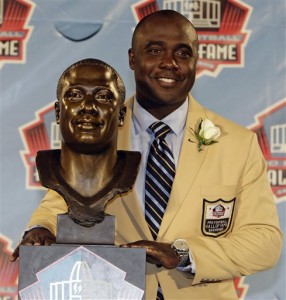
MF: It was fun. I enjoyed playing with those guys. As much fun as it was the one thing that we talk about when we see each other like we did at the Pro Bowl recently. Ricky Proehl, who is now the Carolina Panthers receivers coach, was at the Pro Bowl because the Panthers coaching staff was there for the Pro Bowl.
We just started talking once again. Ernie Conwell, he works for the NFLPA. Me, him, and Ricky were having the same conversation. We always talk about it. The one thing that continues to come up about it is how unselfish we were. When I look at the Denver Broncos that is what you get from them. They really don’t care who is catching the touchdowns, who is catching the passes, who is getting the yards, or who is getting the accolades. It is all about a team goal.
It is hard to get that especially from receivers. We had it. It was special. I definitely enjoyed playing with those guys. We talk about it. I always point to Ricky Proehl. The year before Ricky led the team in receptions, receiving yards, and receiving touchdowns. The year we won the Super Bowl he catches one touchdown. It was touchdown that sent us to the Super Bowl against Tampa in the NFC Championship. He doesn’t say a word about it the whole season. That is the unselfishness you need in order to win games like that.
Feb 3rd

Tony Gonzalez Final Four Interview
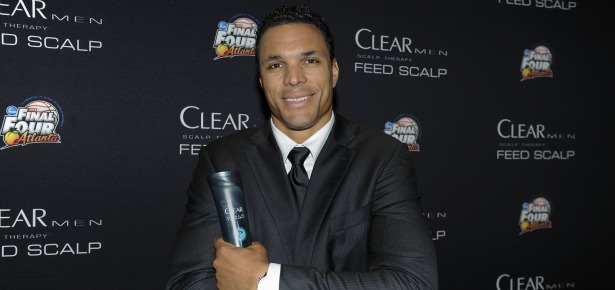
When Clear Men’s Scalp Therapy sent us to the Final Four in Atlanta, we got to spend a few minutes with Falcons tight end, future Hall of Famer and all-around gamer Tony Gonzalez. Gonzo just agreed to come back for one more season with Atlanta. Although he signed a two-year deal, he made it clear that the second year was just in there for cap reasons. The upcoming season will be his last.
And what a career he’s had. He’s a 13-time Pro Bowler (with 10 All-Pro seasons). He’s caught more passes (1,242), for more yards (14,268) and more touchdowns (104) than any tight end in history. His spot in Canton must already be reserved. He’s slam dunk first ballot hall of famer. And, you know, he can dunk, too.
Gonzalez played college basketball at Cal. During his junior year, he played in 28 games and averaged 6.8 points and 5.4 rebounds as a member of the Cal team that made it to the Sweet Sixteen.
Gonzalez is now a spokesman for Clear Men Scalp Therapy. We caught with him at the Coke Zero Fan Experience in Atlanta the day before the Final Four kicked off. We talked about the thrill of playing in NCAA Tournament, what jersey he was going to wear when he finaly gets to Canton, his excitement for next season and what makes Clear Men Scalp Therapy so awesome. Here’s the interview:
While in Atlanta for the Final Four, Gonzalez shot a series of videos for Clear Men that provided tips for creating The Perfect Fanual. Here’s the whole series:
Apr 15th

Tony Meola Interview
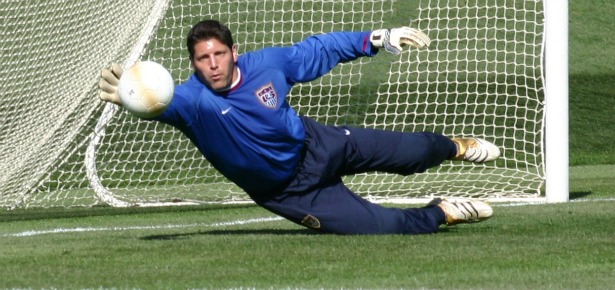
If you’re old enough to remember when the US hosted the 1994 World Cup, you know Tony Meola. The former US National Team goalkeeper made 100 appearances for the national squad between 1988 and 2006. Born and raised in Jersey, Meola and his larger-than-life mulleted/ponytailed persona was one of the first true soccer superstars in the States.
Meola was a foundational stud who helped launch Major League Soccer in the US. He’s an Italian-American who grew up loving soccer (his pops Vincent played reserve fullback for a second division team in Italy), but Tony also excelled in basketball and baseball. Dude was even drafted by the Yankees. Meola is an engaging guy. He has an awesome radio show called Counter Attack Radio and he also plays the drums.
I caught up with Tony last week when he was in Denver on March 21 when he surprised members of the Future Soccer Academy by hosting an Allstate “Good Hands F.C.” Clinic that included free gear and tickets to the US v. Costa Rica blizzard match that took place on March 22. Tony and I discussed the Allstate Clinic future prospects of the USMNT, racism in soccer, the fact that all goalies are a little bit nuts, the ‘94 World Cup, the birth of the MLS, drummers and a whole lot more. Here’s the interview:
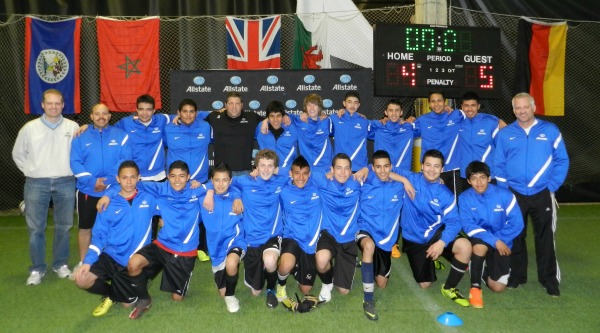
CS: So let’s start with the Allstate Good Hands FC Clinic. Tell me what that’s all about.
TM: Yeah. So Allstate is in their third year of sponsorship with both Major League Soccer and the US National Team. We get to go around the country. I’ve been with the program all three years now. Essentially what we do is the night before a game, we go into the community and we barge in on a practice, which has all been set up through the coaches. We give them a clinic and then ultimately we do some shootouts and we give some prices away and all that kind of stuff. And then at the end everyone comes in and everyone gets a gift from Allstate which is a bag with basically everything that they need for the upcoming season. Literally it’s a group that’s in maybe a little bit more need than some other groups for uniforms, sweat suits, soccer balls, training gear for the coaches. Ultimately, at the end, they’re given tickets to tomorrow night’s game. And in this case, it’s the US-Costa Rica game.
CS: Oh nice. That sounds cool.
TM: Yeah it’s really cool. It’s a really cool night. Allstate does a great job.
CS: So why aren’t there more youth academies in the US? Whether they be from MLS teams or the National Team. You see places in Europe where every club and country has some type of academy where they train these young players. We have such a strong youth soccer culture, but we don’t necessarily put a lot of investment into that development and bringing them forward.
TM: We have 100 academies in the country. All MLS teams have them now, as of finals last year. Major League Soccer has committed above and beyond what the club teams are required to commit to the programs now. It has committed upwards of 20 million dollars to the program. One of the primary focuses is to continue to develop youth soccer players. That’s the only way we’re going to continue to grow in this country.
People started screaming about it a couple years ago when they put the academy program in, but it’s not something that is going to happen overnight. It’s not something that was considered their first priority when they put the league together, but it’s certainly a priority right now. It’s going to take a little bit of time to implement it fully, but from what I’ve seen, everybody is taking steps in the right direction.
CS: You were a foundational contributor to the whole birth of Major League Soccer in ’96. How do you think the league has progressed since then and can they do more to gain exposure and increase popularity?
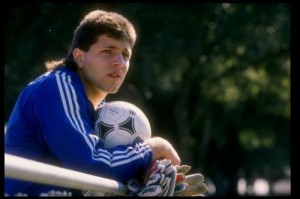 TM: Well certainly there is more exposure, much more exposure. Social media now exists, which certainly didn’t when we started. That’s huge. The television deals that they have are different than the deals we had, you know? So it continues to grow, and that was the goal for everybody. First we had to figure out, how do we grow it in the right way. And then once we had, do we have the resources to grow? Is there the funding in US Soccer to grow it? And they’ve come about on all of these things. Do I think it’s the end of the growth? No, I think there’s still so much more. And I think everyone agrees that there’s still a ways to go, but I also think everybody is happy with the direction that it’s going.
TM: Well certainly there is more exposure, much more exposure. Social media now exists, which certainly didn’t when we started. That’s huge. The television deals that they have are different than the deals we had, you know? So it continues to grow, and that was the goal for everybody. First we had to figure out, how do we grow it in the right way. And then once we had, do we have the resources to grow? Is there the funding in US Soccer to grow it? And they’ve come about on all of these things. Do I think it’s the end of the growth? No, I think there’s still so much more. And I think everyone agrees that there’s still a ways to go, but I also think everybody is happy with the direction that it’s going.
CS: So if we started to see things like time outs or commercials in soccer, do you think that would attract more advertising dollars and maybe help make the sport more popular and viewable if it had more of that TV exposure?
TM: Good question. It attracts so many different ways to advertise, in soccer. The problem with our sport, and I don’t think we’re going to start it here in America, is it’s 45 minutes of running. That’s the one part of the game nobody wants to see change.
CS: Right.
TM: Everyone wants that to flow. From a coaching standpoint, I’m sure a coach wants to have the ability a couple times to have a time out and make some changes, but that’s the beauty. Coaches get one chance to make things right and that’s halftime. Of course they can make some substitutions along the way, but that’s their one time where they can put their imprint on the game.
CS: You were a key member of the ’94 World Cup team that really helped advance the game in the States. What’s your fondest memory of that whole US World Cup experience?
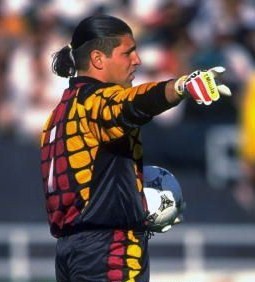 TM: I think the unity of that team. In ’94, I mean we had half the team that played in Europe and half the team that played in the United States. When we got together, the cause was always the same and we knew how important it was. They know how important it is here as well, but we had heard for four years that if we didn’t qualify in 1990, they were going to take the ’94 World Cup away and we knew it was a privilege for us to have it in our country. We understood it and we played as such. Every minute was important to us. Every second we were together was important to us. That’s what I remember about that group. That was never something you had to worry about.
TM: I think the unity of that team. In ’94, I mean we had half the team that played in Europe and half the team that played in the United States. When we got together, the cause was always the same and we knew how important it was. They know how important it is here as well, but we had heard for four years that if we didn’t qualify in 1990, they were going to take the ’94 World Cup away and we knew it was a privilege for us to have it in our country. We understood it and we played as such. Every minute was important to us. Every second we were together was important to us. That’s what I remember about that group. That was never something you had to worry about.
CS: Do you think the USA will win a World Cup in your lifetime?
TM: I sure hope so. It’s hard to say. Even if you take Brazil or Germany or Italy, it’s hard to say if any of those teams will win another World Cup from here on out, in my lifetime. It’s just so difficult to win. There have only been eight or nine countries that have won the World Cup and there’s a reason for that. But I certainly hope so. And we’ve had teams that could compete, the team in 2002, the team in 2010, could all compete with anybody in the world. But you know, you have to get the job done on that day. I’d like to think the answer is a solid yes, but I can’t give you a solid yes.
CS: I gotcha. Do you like what Jurgen is doing with the direction of the National Squad? What do you think the program has to do to take the next step in the international stage?
TM: When I think about Jurgen, for me, he’s going to be –and I say this all the time– he’s going to be judged, and should be judged, on the results.
CS: Right.
TM: Right now he’s under a little bit of pressure. Which, one, I think is good because it shows that people care. If no one cares you never have any pressure. My concern is that sometimes, from reading the federation, he changes the whole program. For me I’d like his concern just to be strictly on the National Team qualifying for the World Cup and progressing that way. Let everybody else worry about development below the national team. As far as the system, I don’t know that the system has changed all that much, if any. I still think it’s about results. That’s what people want to see. With these World Cup qualifiers it’s just vitally important.
CS: The US has such a great track record of producing quality goalies, but it seems that producing that same level of skill with players in other positions has proven a bit more difficult. Why do you think that is?
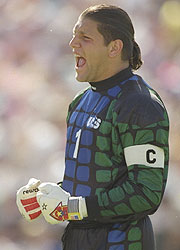 TM: Well it’s an athletic position. I think it’s one of coordination. Our guys generally grew up playing baseball, playing basketball as well as soccer, and are a little bit more well-rounded. Because it’s an athletic position, they can pick it up a lot quicker. We used to have foreigners on our team in multiple positions and we’d play a simple game like basketball or handball and you could tell that their eye-hand coordination was zero. Our field players even, they were good playing basketball, baseball, or whatever else we were playing. So we grew up playing multiple sports, I think it’s good. Eventually you’ve got to concentrate on one to make it to that level, but for the most part I think that’s what’s up with the goal keeping position.
TM: Well it’s an athletic position. I think it’s one of coordination. Our guys generally grew up playing baseball, playing basketball as well as soccer, and are a little bit more well-rounded. Because it’s an athletic position, they can pick it up a lot quicker. We used to have foreigners on our team in multiple positions and we’d play a simple game like basketball or handball and you could tell that their eye-hand coordination was zero. Our field players even, they were good playing basketball, baseball, or whatever else we were playing. So we grew up playing multiple sports, I think it’s good. Eventually you’ve got to concentrate on one to make it to that level, but for the most part I think that’s what’s up with the goal keeping position.
CS: So why did you choose soccer over baseball and basketball? You were pretty accomplished at both. I mean you were drafted by the Yankees, man. What made you gravitate toward the soccer field?
TM: My goal as a kid was to play in a World Cup. I grew up watching Italy, because of my background and watching Dino Zoff in the 1980 World Cup in goal. That was what I wanted to do, unlike most kids, especially in that era. Now it’s probably not so uncommon to have kids dream of playing in a World Cup, but back then it probably was your second or third choice. For me it was just the thing I wanted to do more than anything, and I was lucky enough to be able to live that dream.
CS: Do you think all goal keepers are just a little bit nuts?
TM: (laughs) It would be hard for me to disagree with you.
CS: (laughs) Nice.
TM: I don’t know if that’s before, during, or after the job. I’m not so sure.
CS: Do you think you could currently help the New York Jets win some games?
TM: No.
CS: (laughs).
TM: (laughs) I don’t think so. I think the range has diminished a little bit, but I still think from 45 yards in I’d be alright.
CS: I know you’re a pretty accomplished drummer, who is your favorite drummer of all time?
TM: I would say Neil Peart from Rush. Just like you always try to be like someone you’re never going to be able to be like. Carter Beuford from Dave Matthews Band. Guys like that. Guys that you can just tell are really good at having fun at what they do.
CS: What do you think can be done about the whole racism in soccer situation? It seems to be pretty rampant and kind of a growing problem.
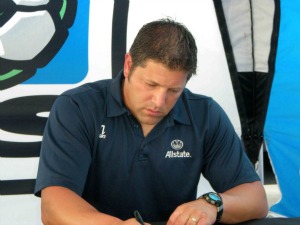 TM: Yeah, unfortunately it is. We have this discussion on our show, it seems like weekly. And it seems like, for whatever reason, in these last couple months it has come to the forefront again. Fortunately we don’t have a lot of it here in the United States. I think we’ve had so much education in the United States, dating back so many years, that kind of helps us. Kids are learning about it in school. I’m not sure what the education is at a young age overseas, but yeah, it’s got to stop. It’s sickening every time I hear about it and every time we have to talk about it. We talk about the same thing, when is it going to end? When are people going to learn? When are they going to stop being so cruel to each other? But some people just don’t get it. They just don’t get it. And the scary part is we have guys on our show that have played 20 years ago, played overseas in different places, they’ll come out and talk about how bad it is now. They’ll give us horror stories about how much worse it was when they were playing. Any offence in that regard is disgusting to me, but to listen to some of the stories they tell, it just blows my mind.
TM: Yeah, unfortunately it is. We have this discussion on our show, it seems like weekly. And it seems like, for whatever reason, in these last couple months it has come to the forefront again. Fortunately we don’t have a lot of it here in the United States. I think we’ve had so much education in the United States, dating back so many years, that kind of helps us. Kids are learning about it in school. I’m not sure what the education is at a young age overseas, but yeah, it’s got to stop. It’s sickening every time I hear about it and every time we have to talk about it. We talk about the same thing, when is it going to end? When are people going to learn? When are they going to stop being so cruel to each other? But some people just don’t get it. They just don’t get it. And the scary part is we have guys on our show that have played 20 years ago, played overseas in different places, they’ll come out and talk about how bad it is now. They’ll give us horror stories about how much worse it was when they were playing. Any offence in that regard is disgusting to me, but to listen to some of the stories they tell, it just blows my mind.
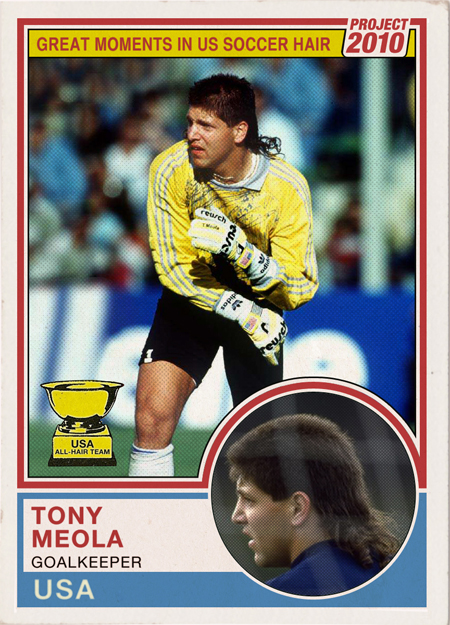 CS: Last question for you. I’ll try to end it on a little bit of a lighter note here. Do you think ponytails will ever make a comeback on the pitch?
CS: Last question for you. I’ll try to end it on a little bit of a lighter note here. Do you think ponytails will ever make a comeback on the pitch?
TM: Oh, that would be my dream.
CS: (laughs)
TM: Even more than the prettier ponytail, would be if the mullet came back.
CS: Oh, that might be asking too much (laughs).
TM: That might be, but hell, bell bottom pants came back for a little, right?
CS: Anything is possible (laughs).
TM: (laughs). Maybe one day. Maybe one day…
Mar 28th

Hines Ward Interview
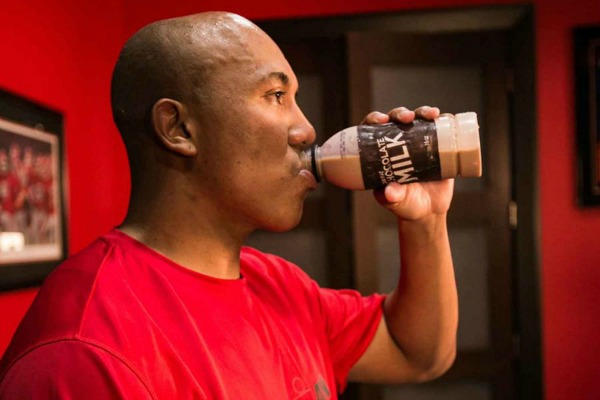
Hines Ward is a lot of things. He’s a first ballot Hall of Famer whose ferocious blocking skills redefined what it meant to play wide receiver in the NFL. Always camera-ready, Ward is a man of a thousand smiles. He just seems to have fun doing whatever it is he’s doing. Since retiring from football in 2011, Hines has made appearances on The Walking Dead, Dancing with the Stars, The Dark Knight Rises and Football Night in America. Dude knows how to stay busy.
Now Hines is looking to add one more title to his already impressive list of accomplishments: IRONMAN. Ward has partnered up with REFUEL | got chocolate milk? and has been training to prepare for the 2013 IRONMAN® World Championship triathlon that will take place in Hawaii this October. But Hines isn’t doing all this by himself. He’s taking three everyday athletes with him.
The journey will be featured in a new documentary web series called BECOME ONE, which will air on www.gotchocolatemilk.com. The three everyday athletes who will accompany Hines were announced at the 21st Annual Endurance LIVE awards gala presented by REFUEL | got chocolate milk?:
- Captain Eric McElvenny is a 29 year old marine from San Diego
- Joshua Kalb is a 24 year old medical student from Denver
- Chrisann Dalton is a 39 year old stay-at-home mom from Bedford, New Hampshire
Ward and company will be training with an elite group of athletes, sports dietitians and coaches, including eight-time IRONMAN triathlon champ Paula Newby-Fraser. After their strenuous workouts, they’ll be refueling by drinking low fat chocolate milk.
You know, I have to admit, that the first time I heard that chocolate milk was a good post-workout recovery beverage for triathlon-level athletes, I was a bit surprised. I mean, I love chocolate milk and all, but I have absolutely zero plans of training for the IRONMAN World Championship, a 140.6 mile triathlon that includes a 2.4-mile swim, a 112-mile bike ride and a 26.2-mile marathon.
But there’s science behind it, man. Low fat chocolate milk is a natural source of protein that can help exhausted muscles recover while also providing essential fluids, electrolytes and calcium, potassium and magnesium. Who knew?!
I met up with Hines Ward at Club Nokia in LA just before the 21st Annual Endurance LIVE awards gala. We talked about the refueling properties of chocolate milk, his training schedule, the current state of leadership in the Pittsburgh Steelers locker room, athletic QBs, player safety, Ward’s Hollywood and political aspirations and a whole lot more. Here’s the interview:
And here’s the trailer for the upcoming BECOME ONE documentary series:
Mar 7th

Maria Menounos Interview
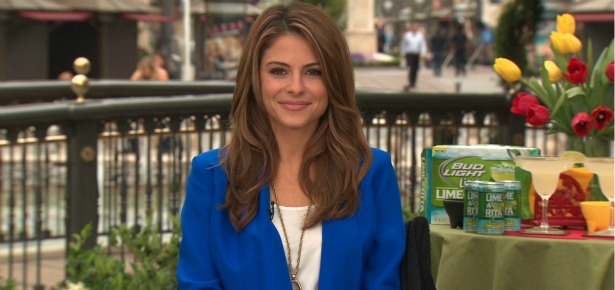
It’s a Cinco de Mayo weekend, people! And if you’re having a hard time deciding what to drink – beers or margaritas – Bud Light has a solution for you. The Bud Light Lime-a-Rita is an 8oz can of 8% alcohol that’s a combination of weekend-ready margarita and a splash of Bud Light Lime. Best served over ice, this malt beverage will take the guesswork out of your weekend drinking plans. It’s an all-in-one, all-inclusive answer to your Cinco de Mayo party needs.
To celebrate the launch of Bud Light Lime-a-Rita, we spent a few minutes chatting with the beverage’s lovely spokeswoman, Maria Menounos. Menounos was born in Massachusetts. Her parents are Greek immigrants and she can speak fluent Greek and Spanish. In addition to being an absolute stone-cold fox, Maria balances a sporty/beauty pageant/journalism background with acting, TV hosting, celebrity dancing and even professional wrestling duties. Basically she does it all.
And when she’s not putting up perfect scores on Dancing with the Stars, interviewing President Obama and the First Family, catching touchdowns from Joe Montana, winning tag team matches at Wrestlemania or losing Super Bowl bets that require her to sport a bikini in the middle of winter, Menounous still finds time to enjoy a beer or a marg or in this case, a beer-marg combo like the Lime-a-Rita.
We talked with Maria about the upcoming Bud Light Lime-a-Rita kickoff party this weekend at the Mandalay Bay Hotel & Casino in Las Vegas, dominating dancing and wrestling, staying so damn fit, what her Greek parents think about her racy photo shoots and a whole lot more. Here’s the full interview:
We’re heading out to the kickoff party in Vegas this weekend. We’ll let you know how it goes! Have a safe and fun Cinco!
May 4th

Danny Pudi Interview
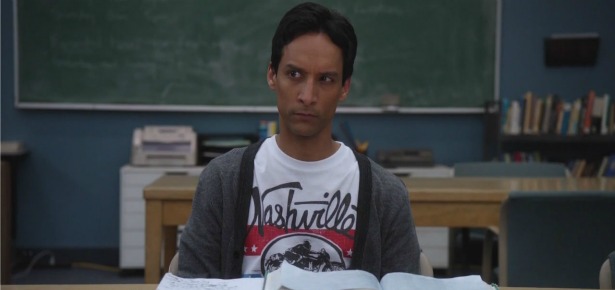
You know Danny Pudi. You’ve seen his comic skills and on-point timing on NBC’s hit show Community. Pudi plays Abed, an awkwardly loveable geek with a passion for TV and films (a guy who may or may not have Asperger’s syndrome). But Pudi’s not as socially awkward as the character he plays on TV. In fact, the guy’s a pretty smooth dude.
He’s engaging, humble and always willing to make himself the butt of a joke. He’s a sharp guy, but when it comes to his brand of humor, he’s a giver, not a taker. He has the type of humility you’d expect from a guy who grew up having to explain that he’s half Indian and half Polish.
Pudi is a mellow, approachable cat who grew up in Chicago and cut his teeth doing improve at Second City. In addition to his TV work, Pudi’s got a few film projects lined up, he’s new Dad with twins and he’s also working with Speed Stick to help guys deal with random embarrassing situations.
Yes, Pudi and Speed Stick are kicking off a new campaign called “Handle It.” The gist is this: if you’ve got a weird, totally awkward situation that you need to sort out, send a tweet to @SpeedStick (before May 14) and use the hashtag #HandleIt. Danny Pudi will select his favorite submission and the winner will get to see their submission turned into a video where Pudi will provide advice as an “inner voice.”
We talked with Pudi about the #HandleIt campaign, improvising on the set of Community, working with Chevy Chase, fame, fatherhood, Alison Brie’s hotness and a bunch of other things. Here’s the full interview:
CS: So tell me a little bit about how you got involved with Speed Stick and the #HandleIt campaign.
DP: Yeah I think they came to me and we teamed up because I too am fond of and prone to awkward moments (laughs).
CS: (laughs).
DP: Many a time. Starting from childhood when my Mom made me the center of a Polish dancing troupe and I had to explain why that was to most of my friends, all through all my awkward moments with girls and high school, with my wife – which continues to this day. That kind of stuff, from lighting myself on fire, from trying to figure out how to parent a child – which I have two kids now. I’m always hoping I will learn something from somebody else’s awkward moments. My very first red carpet for Community, I ended up walking down the carpet and realized halfway down that I had spinach in my teeth – or actually kale, I had kale in my teeth.
CS: (laughs)
DP: So these kind of things happen to me quite a bit. I even done a couple live shows here like mortified regarding some of these awkward moments. I was excited to partner with Speed Stick, cause we’re asking guys to Tweet some of their awkward stories and how they handled it to @SpeedStick with the hash tag #HandleIt. Out of those stories we’re going to make a video and I’m going to narrate it. So I’m excited to see what we’ll come up with.
CS: So were you involved in the scoping of how you wanted the campaign to play out?
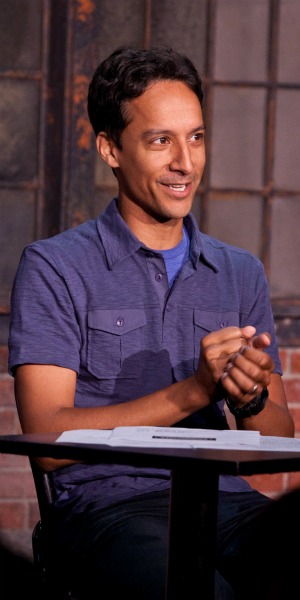 DP: No not really. They came up to me and they told me that they were doing this campaign regarding “handle it” moments and I think it’s something that just kind of resonated with me because there’s nothing I enjoy more and that seems more honest and true to me as an actor and person than that awkward moment between people. And I think it’s part of why I love my characters like Abed. He’s constantly questioning social etiquette, always second guessing how you handled a situation. That to me is life. My wife makes fun of me all the time for some of the things that happen to me. I woke up one time with a squirrel in my bed and I was trying to tell people about that and I ended up freaking out and screaming, and this is when I was doing summer stock theatre. One time I walked out of a building and as I walked out of the building I was really holding in a spit and as soon as I opened the door of the building I spat. I have terrible peripheral vision and I realized I spit in a guy’s face.
DP: No not really. They came up to me and they told me that they were doing this campaign regarding “handle it” moments and I think it’s something that just kind of resonated with me because there’s nothing I enjoy more and that seems more honest and true to me as an actor and person than that awkward moment between people. And I think it’s part of why I love my characters like Abed. He’s constantly questioning social etiquette, always second guessing how you handled a situation. That to me is life. My wife makes fun of me all the time for some of the things that happen to me. I woke up one time with a squirrel in my bed and I was trying to tell people about that and I ended up freaking out and screaming, and this is when I was doing summer stock theatre. One time I walked out of a building and as I walked out of the building I was really holding in a spit and as soon as I opened the door of the building I spat. I have terrible peripheral vision and I realized I spit in a guy’s face.
CS: (laughs).
DP: I had to explain myself, make sure I didn’t get punched in the face. It was also on my shirt so I was wet. I gave him my sleeve so he could like wipe the spit off his face on my sleeve. And the guy was right next to me so it’s like (laughs) I don’t know. More than anything I’m hoping this generates a community of people who endured these awkward moments together and you have to share that you’re not the only one who has suffered (laughs).
CS: So I read that interviews kind of weird you out still. How are you coping with all the fame and attention you’ve been getting?
DP: It’s strange for me. I’m not used to it. I like to kind of do goofy things, walk around and make sure I can pick my nose in peace. But now people watch me a little bit more so that’s interesting. I do think it’s actually pretty cool too to be connecting with people, audience. The show is actually kind of making an impact. I love that. I love being able to play a character that has—like gives a voice to people. Especially a character that’s a little bit more unusual and not typical to American television. But yeah, as far as like getting used to it, it is weird. Like all of the sudden walking down the street, someone yelling “Abed! Hey Abed! You going to get coffee?” or whatever.
CS: (laughs)
DP: Or “Abed you’re buying blueberries?” and I’m just buying blueberries, just kind of stuff like that. It makes you a little self conscious but, you know, I’m doing okay.
CS: Does it change you at all or do you still feel like you’re the same dude?
DP: I still feel like I’m the same dude. Just because, I don’t know, I’ve been married for a while and most of my friends and my family are pretty down to Earth. And also my family—my mom speaks Polish, she’ll yell at me and curse me out in Polish if I’m doing anything weird. So it’s a nice way to kind of come back to reality. I do still feel like I live in a small town. And I’m not from a small town, but most of my friends and my wife, that’s really who I hang out with. The other thing is the show I’m working on, Community, they’re truly some of the greatest people and they’re very family oriented. And we are like a family so that’s all we do. We literally work and hang out with each other then we go home and that’s it. And then I cry (laughs)
CS: (Laughs)
DP: (laughs) I just find a place where I can cry once a week. That usually does the trick.
CS: So what’s it like balancing your work schedule with being a new dad?
DP: That’s really difficult – I don’t know. You’ll have to ask my wife. She has become parent of the century because we have twins too, and she’s trying to do it all. She’s incredible. I mean, I love it. We’re having so much fun. The babies are amazing we’re really blessed. They’re really inquisitive. Every day is sort of a new adventure. They’re three months old now so it’s like all these new milestones. Now they’re mimicking us a little bit. They smile at you and recognize you and man, there’s no … there’s no greater feeling in the world and also no heavier responsibility in the world. I used to like get worried or panicked about memorizing lines for Community and now I’m like if I can get to set or if I can get somewhere when the babies are down for a nap, I feel like I literally just won an NBA championship.
CS: (laughs) So do you like pop culture and movies and TV as much as your character Abed does?
DP: I do. I think that I have an appreciation for pop culture. I think I’m not as, I guess, obsessive in terms of Abed and his knowledge. I definitely don’t have the grasp and reach that Abed does, and the other writers in Community that do Abed. I feel like there are 10 brains working there. You know, there are certain things, like “Raiders of the Lost Ark” was just on the other night on USA and that’s like… I get angry when it comes on at 11:00 at night because there’s no way I’m going to be able to fall asleep. I’ve got to watch the whole movie. So there are some things like that where I do feel I fall in line with Abed, but he definitely has a way stronger knowledge. I was more of a famous sports kind of guy. I would memorize baseball cards and baseball players as a kid and I was obsessed with Michael Jordan. That was how I was sort of a fanatic.
CS: So with Community I understand that there’s lots of improvisation that goes on on the show, especially those final segments like with you and Donald Glover. Coming from Second City, that’s something that you really have to enjoy right?
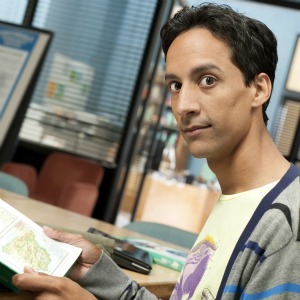 DP: Oh I love it, yeah. I mean to me, I love watching theatre, I love watching TV shows, but there’s no greater inspiration for me than when I watch a really great live improv or sketch comedy show. Like a Second City or Improv Olympic show. Just because it’s just so spontaneous – you’re really part of the discovery as an audience and as a performer. And I think there’s just something really special about being in one place in one row and one moment, and everyone experiencing something truly brand new and spontaneous together. So that to me is something I just love and I think there is a spirit of that in our show definitely. I think Donald Glover and Jim Rash are exceptional improvisers, but most of our cast is really strong comedic actors. We have this group vibe that developed over three seasons. We’re really able to play off each other pretty well. But that’s just fun. Something happens, we start going in a certain way, it’s always kind of fun just to see what happens. It all starts with something specific and really man, it’s the writing which I think helps create these really great characters and allows us that sort of freedom to play.
DP: Oh I love it, yeah. I mean to me, I love watching theatre, I love watching TV shows, but there’s no greater inspiration for me than when I watch a really great live improv or sketch comedy show. Like a Second City or Improv Olympic show. Just because it’s just so spontaneous – you’re really part of the discovery as an audience and as a performer. And I think there’s just something really special about being in one place in one row and one moment, and everyone experiencing something truly brand new and spontaneous together. So that to me is something I just love and I think there is a spirit of that in our show definitely. I think Donald Glover and Jim Rash are exceptional improvisers, but most of our cast is really strong comedic actors. We have this group vibe that developed over three seasons. We’re really able to play off each other pretty well. But that’s just fun. Something happens, we start going in a certain way, it’s always kind of fun just to see what happens. It all starts with something specific and really man, it’s the writing which I think helps create these really great characters and allows us that sort of freedom to play.
CS: Now you kind of alluded to this already but it’s really the talent of the people that are around you, with the cast, that makes that successful improv possible, right?
DP: Yes. Definitely. That to me is like the number one thing. That’s why I love to be—I feel like I excel and I feel challenged and most excited and liberated when I’m in an ensemble working with people towards a common goal. That to me is the funniest comedy too, where two people or three people or four people are all trying to do the same thing, all failing in their own individual ways. I mean that’s really entertaining for me to watch. So it’s as simple as watching two people with their bags stuck in a door and watching one person ask for help, the second person comes to help, and these people are struggling and still they can’t figure it out. And you want to help them of course, but there’s something so entertaining about two people trying to help each other, but stuck in a bubble that I will always find entertaining.
CS: When is your character going to get a love interest?
DP: I don’t know, you know? I mean there’s been hints at it. There was the CIA agent last year and there seemed to be sort of a good dynamic between the two. I think it just clicked. Very factual dialogue, they just understood each other. Abed takes direction really well so if you tell him to kiss you now and kiss your for 4 seconds he will do that (laughs). Abed had a Han Solo moment with Annie Edison last year, I think that was fun for Abed, especially to play the heroic character. But I don’t know. It’s definitely going to take a very patient and interesting girl (laughs).
CS: (laughs)
DP: And he’s going to have to love kickboxing.
CS: (laughs) What can you tell me about the possibility of a fourth season?
DP: I don’t know. I’ve been told from others around that they’re confident in it but there’s nothing confirmed yet. We’re all still waiting, just like everybody else. I know that from the history of how I’ve been informed – like about being picked up from hiatus – I was one of the last people to find out.
CS: (laughs) Gotcha.
DP: So I do have a feeling that people on Twitter and Facebook will know probably about an hour or two before I do. Actually even sooner. I don’t know if that’s because I’m aloof or because they don’t want to tell me because they’re scared of how I’ll react (laughs).
CS: (laughs)
DP: We don’t know. We’re hopeful. I think we had a really great strong ending to season three and we’re looking forward to graduating. It makes sense and it would be fun to see what happens in the senior year at Greendale, but in the meantime we did look at every episode as a potential last episode – which is why they were so ambitious.
CS: So I read something on your Wikipedia page that sounded like the coolest couple sentences ever; that you won the Chris Farley scholarship and that lead to an improv comedy event with Jim Brewer and Dave Chapelle? I mean, that has to be insane.
DP: Oh yeah, it was completely overwhelming. I only remember about 30% of it (laughs).
CS: (laughs)
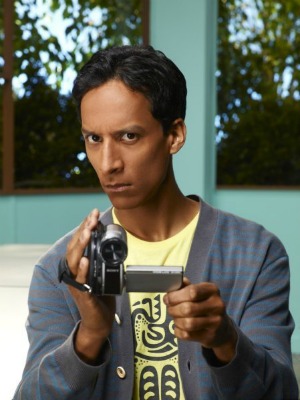 DP: I kind of feel like I’m always thrust up to these very “trial by fire” situations. It was like when I first went in to read for Community. It was Joel McHale, Chevy Chase, and Gillian Jacobs there and I didn’t know what to do. I couldn’t believe I was sitting there at this table with these people. So it’s the same thing with that event. In college I was a junior and won the scholarship. When Chris Farley passed away they developed this scholarship in his name, a comedy scholarship, I won it. At the time, I wasn’t sure what I wanted to do. I was kind of a little lost, and it led me to study comedy. I was doing some theatre in college but I was really becoming more and more interested in the art of comedy. I learned that Chris Farley had studied at Second City and that eventually led to a Saturday Night Live career. The first thing I do is sign up for a class at Second City and that really kind of changed my life in terms of realizing that … first of all getting me out there so that I could do it for a living, and also it was just so much inspiration. That place is really historic and kind of an institution. Going in there and watching shows and doing shows, I just knew right then I wanted to do this for a living. And one of the first things they did, I was asked to be in this show, just improvise a little bit in between the sets that Jim Brewer and Dave Chapelle did, and I was just blown away at how good they were and also completely over my head. Which was fun though, because I realized more than anything, I needed to start studying for real.
DP: I kind of feel like I’m always thrust up to these very “trial by fire” situations. It was like when I first went in to read for Community. It was Joel McHale, Chevy Chase, and Gillian Jacobs there and I didn’t know what to do. I couldn’t believe I was sitting there at this table with these people. So it’s the same thing with that event. In college I was a junior and won the scholarship. When Chris Farley passed away they developed this scholarship in his name, a comedy scholarship, I won it. At the time, I wasn’t sure what I wanted to do. I was kind of a little lost, and it led me to study comedy. I was doing some theatre in college but I was really becoming more and more interested in the art of comedy. I learned that Chris Farley had studied at Second City and that eventually led to a Saturday Night Live career. The first thing I do is sign up for a class at Second City and that really kind of changed my life in terms of realizing that … first of all getting me out there so that I could do it for a living, and also it was just so much inspiration. That place is really historic and kind of an institution. Going in there and watching shows and doing shows, I just knew right then I wanted to do this for a living. And one of the first things they did, I was asked to be in this show, just improvise a little bit in between the sets that Jim Brewer and Dave Chapelle did, and I was just blown away at how good they were and also completely over my head. Which was fun though, because I realized more than anything, I needed to start studying for real.
CS: So what advice do you have for young comics or young people interested in improv that are just getting started? Is it time on task? Is it variety? What would you say to young people who are interested in following a similar path?
DP: That’s really a tricky question because I do think that people learn differently and I think people are inspired in different ways. One of the things, for me, that I know that works is I needed to be surrounded by people that are better than me. I always feel like that helps. So at Second City I made sure I’d take classes from people that I’d see on stage or really admired their talent or their point of view. So that helped. It also helped performing a lot because I think you develop your voice. I didn’t move straight to Los Angeles, I was in Chicago for about three years before I moved to Los Angeles. But Chicago allowed me to perform a ton so by the time I got to Los Angeles, even though I came out there with nothing, I at least felt like I started to develop my own comedic voice and had enough performances under my belt to kind of feel confidence when I was on stage. So that’s what I did. I watched a ton of shows. If I saw a show I liked at a theatre, I would investigate it a little bit more. And beyond that one of the things I’m obsessed with – I’m still obsessed with— is I watch people all the time. I just watch people and I talk to people and I think that there’s no greater inspiration. You learn, as an actor, just by watching people and seeing how they behave, I think that’s kind of worked for me.
CS: Now I know you’ve got some film projects coming up like Knights of Badassdom. What was it like working with Peter Dinklage from Game of Thrones?
DP: Incredible. I only spent a couple of weeks with the cast, sort of a minor role, but working with Steve Zahn and Peter Dinklage was pretty incredible. At the time Game of Thrones wasn’t out yet.
CS: Right.
DP: So I didn’t know how amazing it was. But I knew of Peter Dinklage. I mean now he’s my favorite character on Game of Thrones – the Lannisters, I mean it’s just an incredible show. That whole cast was pretty amazing, working with Steve Zahn and Ryan Kwanten. Again it’s one of those things where I love being surrounded by other actors who I’m a fan of so it’s kind of fun for me to be a fan and also be a participant in anything I do.
CS: And tell me a little bit about The Guilt Trip, the comedy written by Dan Fogleman that’s coming up.
DP: Oh yeah. That’s a fun movie. It’s with Seth Rogen and Barbara Streisand. I get a minor part where I just play a friend of Seth Rogen, but I like the story. I think it was really fun. I play a chemist, and this is one of those—I call it one of my “Sanjay” roles. I’ve definitely played quite a few Sanjays.
CS: (laughs).
DP: (laughs) I’m adding another Sanjay to the belt.
CS: Okay just a couple more questions for you, rapid fire.
DP: Okay.
CS: Is Allison Brie super hot in person?
DP: Yeah. Next? (laughs)
CS: (laughs) What’s it like sharing a stage with Chevy Chase?
DP: It is like being in a bizarre hard work study program (laughs). Next?
CS: (laughs). I think I’ll just end it there. I don’t want to take up too much time, but I appreciate the time, Danny.
DP: No worries, man. Thank you so much.
CS: All right take it easy.
DP: Cheers man.
So yea, Danny Pudi’s a pretty cool, down-to-Earth guy who can make you giggle on the fly. If you have an awkward moment to share with Danny, hit @SpeedStick up on Twitter with the hashtag #HandleIt before May 14.
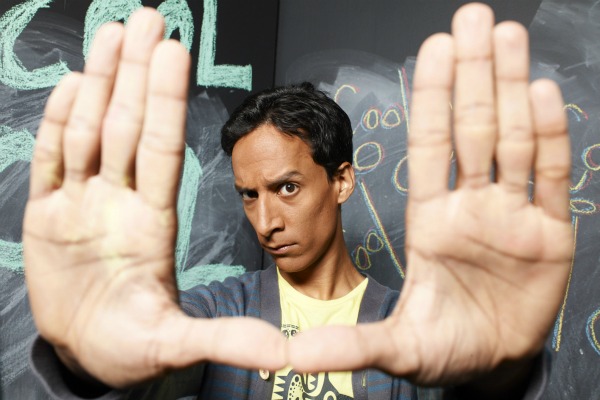
Apr 30th
